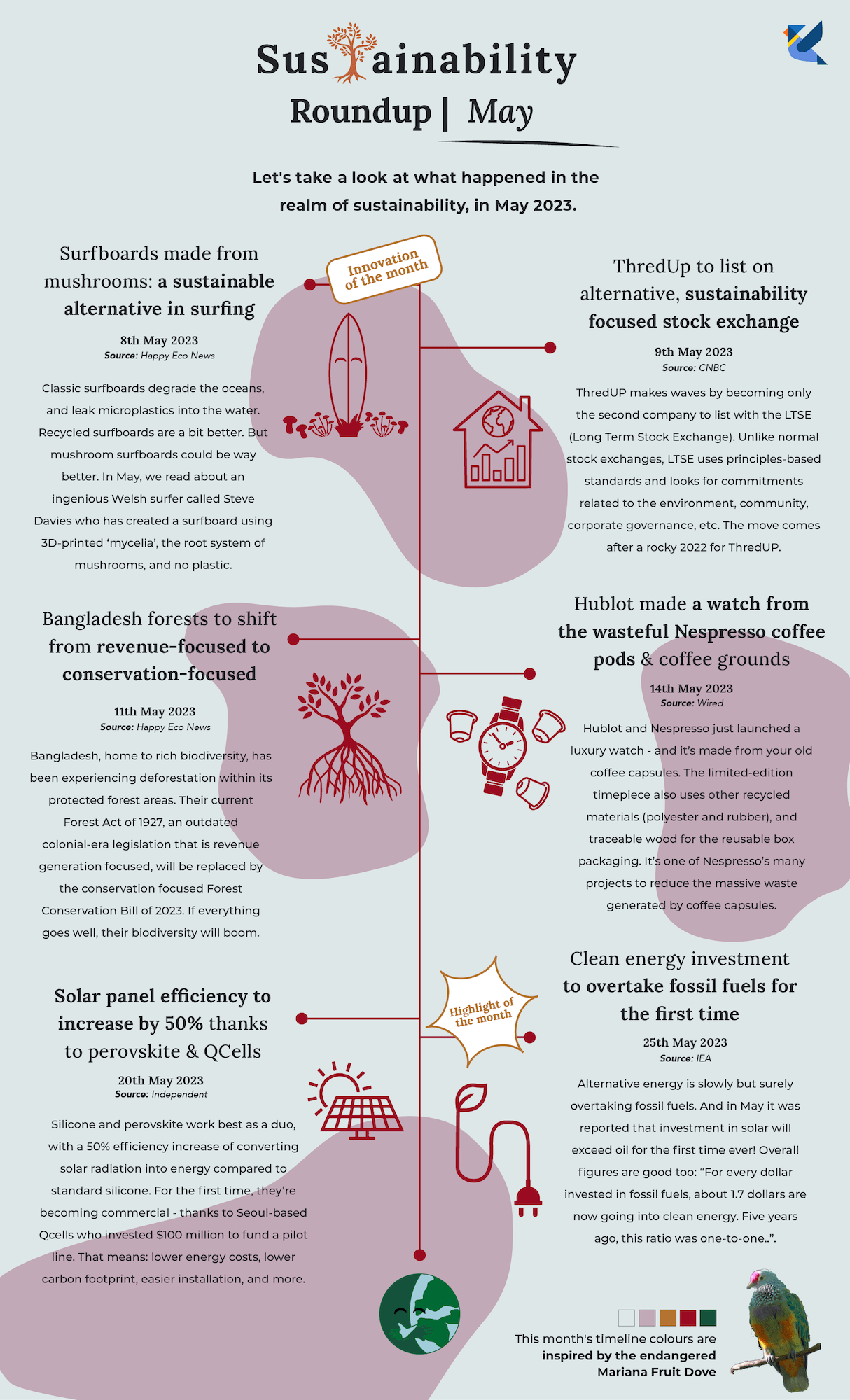We live in wild times. The alarms are growing louder but the solutions are getting cleverer, and stranger. Amid the inevitable fool’s gold, there are surely some era-defining inventions and decisions being made. We’d like to think that we’re picking up some of them in our monthly roundups.
In May, we’ve nicked the colours of the Mariana Fruit Dove for our timeline of key events. Unlike the dull, ubiquitous feral pigeon, this chonky bird is flamboyant and scarce. There are hardly any of them left in the Marianas islands – and they’re now extinct in Guam.
Mushroom Surfboards: A Sustainable Alternative in Surfing
May 8th, 2023
Link: Happy Eco News
Smart people are finding myriad uses for fungi. You name it – mushrooms could solve it. Still, even in today’s fungiphilic world, surfboards are a surprising application for ‘shrooms.
Why would you make a surfboard from… a mushroom!? Well, there are big issues with classic surfboards. The materials they’re made from degrade the oceans, and leak microplastics. These issues are at odds with the sport’s eco-friendly aesthetic.
Recycled surfboards are a bit better. But mushroom surfboards could be way better. In May, we read about a Welsh surfer called Steve Davies who has prototyped a surfboard using 3D-printed ‘mycelia’, the root system of mushrooms, and no plastic.
It’s fully biodegradable and the remains could help rehabilitate coral. Here’s a video about it all:
The surfing industry is expected to expand to $3.2 billion by 2027, so we may be needing more of these. Godspeed, Steve. And make sure those mushrooms are buoyant.
P.s. If you like this, you may also enjoy this news about robot jellyfish being used to clean our oceans.
ThredUp to List on Alternative Stock Exchange
May 9th, 2023
Link: CNBC
A lot of the time, sustainability means betting on the future and taking a risk with the present. Online resale platform ThredUP is a company that seems to get that.
The platform announced that it was joining the LTSE (Long Term Stock Exchange), making them the second listed company. Yup, second. ThredUP’s companion is software company Asana.
In all fairness, the LTSE is relatively new. It was founded in 2015, got approval in 2019, and started trading in September 2020. Its goal is to challenge the idea that businesses exist only to make money. Yes, companies still have to publish quarterly earnings. But, they must also show how those reports support a larger narrative, through the LTSE’s principles-based standards. It’s no longer about the short-term.
ThredUP is now a dual-listed company. It first went public in 2021. Let’s hope there’ll be way more than a pair of participants, this time next year.
Bangladesh Forests to Shift From Revenue- to Conservation-Focused
May 11th, 2023
Link: Happy Eco News
Bangladesh has not only been experiencing deforestation within its protected forest areas, but the deforestation within those protected boundaries is more severe than in their immediate surroundings. The protection in this case, seems almost sarcastic.

Now that may change. The Forest Act of 1927, an outdated colonial-era legislation that is revenue focused, is being replaced by two new laws – deemed a “paradigm shift” – that will shift the focus to conservation.
The Forest Conservation Bill of 2023 will protect forests and Bangladesh’s biodiversity within forest areas, as well as prohibit cutting trees outside of forests, too.
Bangladesh is home to rich biodiversity – such as the largest mangrove forest in the world: the Sundarbans Reserve forest. But it’s suffering from the cruel effects of climate change. If everything goes to plan, Bangladesh’s “protected” areas will experience a biodiversity boom.
Hublot Has Made a Watch From… Nespresso Pods
May 14th, 2023
Link: Wired
Try to think of unlikely collaborations and this is easily somewhere at the top of the 2023 list so far.
Luxury watchmaker Hublot and coffee company Nespresso. At this point, the only thing they really had in common was their Swiss origins.

Hublot already has a bit of a reputation for material experimentation, and only continues to take things further. The two brands created a watch using recycled aluminium and leftover coffee grounds.
Despite its extravagance, the partnership shows some consistency on Nespresso’s part. Coffee capsules are said to use less greenhouse gases than other coffee preparations, but create a lot more waste – more than 550,000 metric tonnes worth. Over the years, Nespresso has gotten involved in several collaborative projects using old pods.
The Big Bang Unico Nespresso Origin comes in one not-so-subtle shade of green, and is available to anyone able to spend €25,200 on the limited-edition piece. We suppose you have to start somewhere.
Solar Panel Efficiency to Increase by 50% Thanks to Perovskite & QCells
May 20th, 2023
Link: Independent
Last December, solar energy took a huge leap forward with the efficiency level of perovskite-silicon tandem solar cells hitting a record.
Compared to regular silicone-based solar cells, which have a 22% efficiency in converting solar radiation into electrical energy, all-perovskite tandem cells have a 29.3% efficiency. And – wait for it – perovskite-silicon tandem cells have a 32.5% efficiency. In short, perovskite and silicone work best as a dynamic duo.
Technical details aside, this revolutionary solar cell technology has been limited to lab tests and research… until now.
Seoul-based Qcells is investing $100 million to fund a pilot production line of the tandem solar cells – projected to be operational by late 2024. What this means for us: lower energy costs, lower carbon footprint, easier installation of solar panels, and ultimately solar adoption becoming more accessible.
Investments in Renewables Will Overtake Fossil Fuels for the First Time
May 25th, 2023
Link: IEA
Alternative energy is like the tortoise, slowly but surely gaining on fossil fuels, the hasty hare. And in May it was reported that investment in solar will overtake oil for the first time ever.
The overall figures look promising too. About $2.8 trillion is earmarked for energy investment in 2023, of which more than $1.7 trillion will fund clean technologies. The remainder, just over $1 trillion, goes to coal, gas and oil.
IEA Executive Director, Fatih Birol, points out how far we’ve progressed in a small amount of time: “For every dollar invested in fossil fuels, about 1.7 dollars are now going into clean energy. Five years ago, this ratio was one-to-one..”.

It’s invigorating news. Yet, the counterpoint is that fuel investment has still rebounded, post-pandemic. If countries want their net zero commitments to be reached then fossil fuel investment must plummet more. There’s also a lot of work to be done to make sure that lower-income countries can be part of the renewable race, too.
And now some news from Akepa: in May we started the process of becoming 100% powered by clean energy by 2025, as part of a new certification. We’re proud to be doing our bit and there’ll be more news on that soon.
The energy behind this post has expired, on that note. The lights have gone out. We’ll be back next month.




Leave a Reply